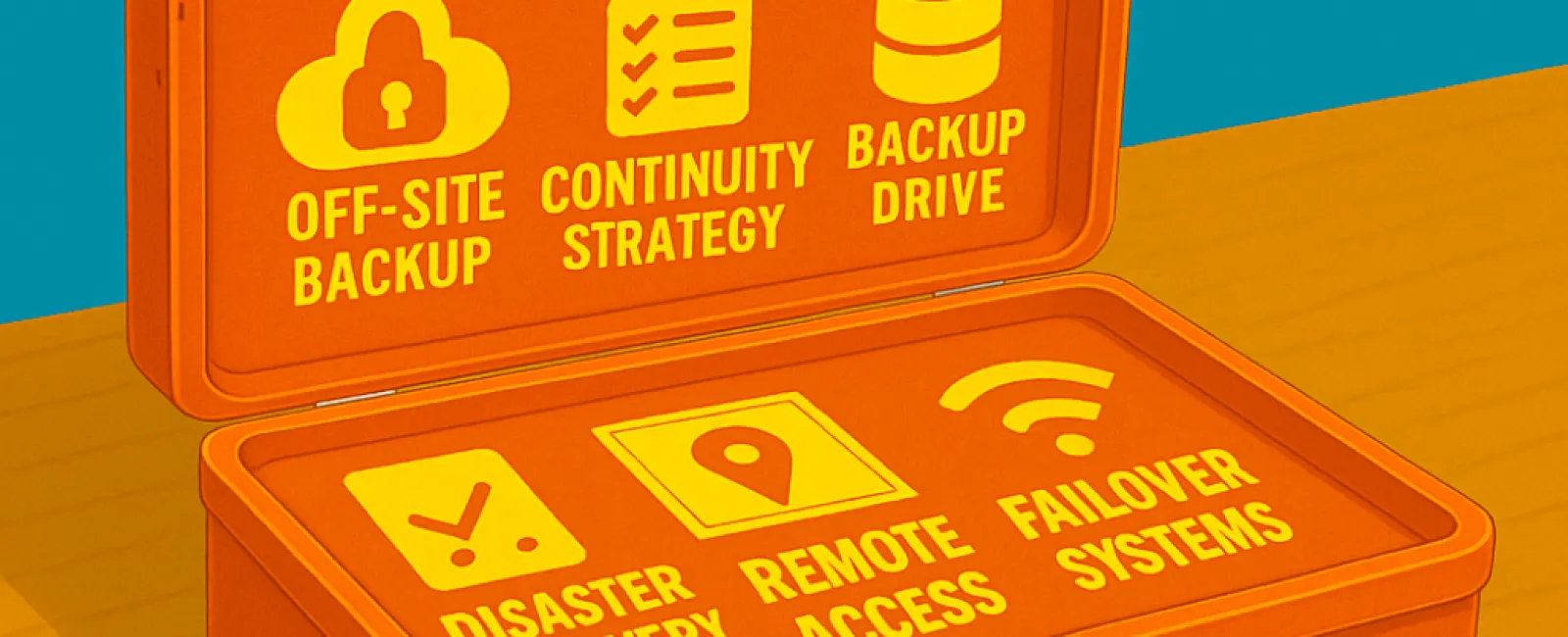July 28, 2025
Unexpected power failures, cyberattacks, hardware malfunctions, and natural disasters can strike without warning, causing severe disruptions to small businesses. Many believe that simply having backups is sufficient, but restoring a file alone doesn't guarantee business continuity. Without access to critical systems, remote work capabilities, or effective communication with your team and clients, even a brief interruption can escalate into a significant operational setback. A dependable IT partner should equip you not only with backups but with a comprehensive strategy to ensure your business remains fully functional under any circumstance.
Backups Alone Aren't Enough - You Need a Robust Continuity Plan
Backups are undeniably crucial, but they represent just one piece of the puzzle. What your business truly requires is a proactive business continuity plan designed to maintain operations during and after any major disruption.
When your systems fail, files become unreachable, or your physical office is compromised, relying solely on local backup files offers little relief. Without a well-defined plan to swiftly restore operations, you risk severe losses in revenue, reputation, and regulatory compliance.
Understanding the Difference: Backups vs. Business Continuity
Many businesses confuse these two concepts:
●
Backups are designed to recover data.
●
Business continuity ensures your operations keep running seamlessly, regardless of disruptions.
An effective continuity plan addresses critical questions such as:
●
How quickly can we resume full operations?
●
Where will our team work if the office becomes inaccessible?
●
Which systems are essential to our mission?
●
Who is responsible for initiating the recovery process?
The plan also integrates vital elements such as:
●
Encrypted, off-site, and immutable backups
●
Clearly defined recovery time objectives (RTO) and recovery point objectives (RPO)
●
Preparedness for remote workforce operations
●
Redundant infrastructure and failover solutions
●
Regularly scheduled disaster simulation drills
If your IT provider cannot confidently guide you through these components, you aren't fully protected—you're just fortunate so far.
Could This Really Happen to Your Business?
This isn't a scare tactic—it's a reality many businesses face. Consider recent events:
●
Florida hurricanes forced hundreds of businesses to halt operations, especially those lacking cloud-based access.
●
North Carolina floods destroyed on-site servers, wiping out months of critical records and invoices.
●
California wildfires razed entire office buildings in the Pacific Palisades, many without any off-site recovery plans.
●
Numerous small businesses targeted by ransomware attacks have discovered their backups were either corrupted or never properly tested.
Disasters don't discriminate by company size—they impact businesses like yours every day.
Essential Questions to Ask Your IT Provider Now
If disaster struck tomorrow, would your business continue running?
Make sure to ask your IT partner:
●
How quickly can we recover from a ransomware attack?
●
Are our backups regularly tested, and which systems are covered?
●
What is the contingency plan if a flood or fire damages our office?
●
Is our continuity strategy aligned with industry compliance requirements?
●
Can we maintain client services if our team must operate remotely?
If you don't have full confidence in these answers, your business may already be vulnerable.
Disasters Are Inevitable. Downtime Doesn't Have To Be.
While you can't prevent every power outage, storm, or cyberattack, you can control how your business responds.
A competent IT provider helps you recover.
An exceptional one ensures your business never misses a beat.
Ready to evaluate your business's preparedness?
Click Here or call us at 419-678-2083 to schedule your FREE 10-Minute Discovery Call, and together, we'll ensure that no disaster ever causes downtime.




